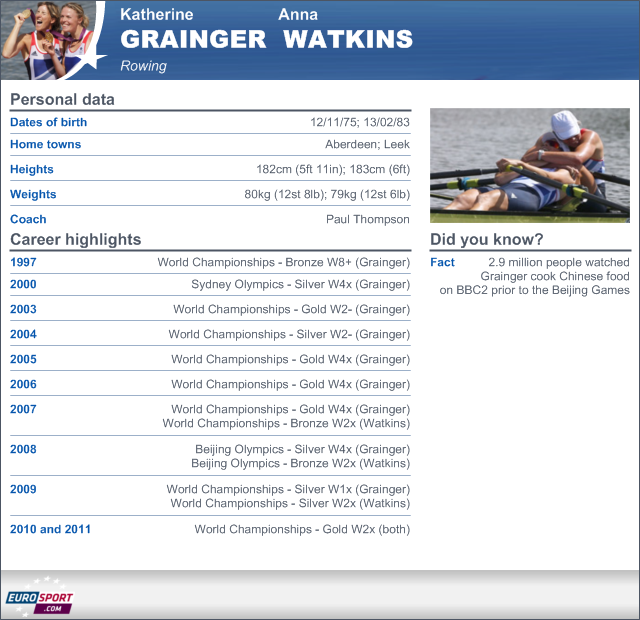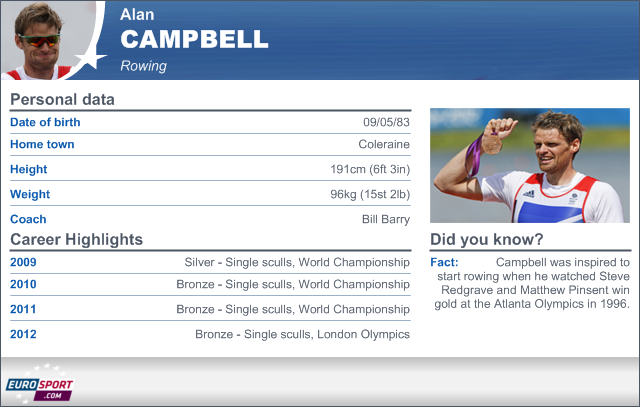Grainger, Watkins win gold
/dnl.eurosport.com/sd/img/placeholder/eurosport_logo_1x1.png)
ByEurosport
Updated 04/08/2012 at 03:07 GMT
Britain's Katherine Grainger won an Olympic gold medal at the fourth time of asking when she powered to victory in the women's double sculls with partner Anna Watkins in front of 25,000 ecstatic fans on Dorney Lake.
Great Britain's Anna Watkins (L) and Katherine Grainger pose on the podium after receiving their gold medals (AFP)
Image credit: AFP
The British duo led from the start and moved further ahead in a commanding performance to finally give Grainger gold to go with the three silver medals she won at the last three Games.
The British duo looked to the skies and raised their arms aloft as they crossed the line, later waving to the fans who had roared them down the last 300 metres of the race and embracing once they got to the side of the lake.
Grainger was in the first British women's crew to win an Olympic medal when she won silver in a quad in Sydney but the silvers she won in Athens and, particularly Beijing, when she was pipped on the line, had meant the local fans were rooting for the 36-year-old to win.
“It was worth the wait,” said Grainger. “Steve Redgrave promised there’d be tears of joys this time and there are.
“It felt like we did an emphatic job – we knew we had the goods and it was delivered today. It’s the sense of satisfaction of the job well done for us.
“I don’t need to be asked the gold question ever again. I feel this is people’s medal. A lot of people have wanted this for me, my family and everyone who has ever rode with me, or people from University. It feels so much more special.
“My mum is a bit nervous of Rio (who are hosting the Olympics in 2016). She found this one least stressful at this.”
They got off to a fast start and slowly pulled away from their nearest rivals, Australia, in a commanding performance that is likely to be Grainger's last at an Olympic regatta.
Australia took silver three seconds back and Poland took third some nine seconds behind that.

The Great Britain duo of George Nash and William Satch won bronze in the men's pair behind New Zealand's Hamish Bond and Eric Murray at Eton Dorney.
The New Zealand duo had entered the final as the stand-out favourites after winning the last three world championships and smashing the world best time in their heat earlier this week.
They moved through a fast-starting French crew after 500 metres and then effortlessly pulled away from the rest of the field with their long relaxed stroke, winning by two lengths of clear water and leaving the rest of the field to fight for the remaining places.
France took silver ahead of Britain.
The 30-year-old Murray and Bond, 26, have looked untouchable all season, regularly winning races by huge margins to make up for their disappointing performance at the Beijing Games where they missed the final as part of a four crew.
Murray raised his arms and looked to the skies as they crossed the line while Bond repeatedly slapped his hands in the water and gasped for breath.
Britain appeared to veer out of their lane in the sprint for the finish but the result is likely to stand as they crossed into the New Zealand lane and did not impede anyone.

Alan Campbell also won bronze for Great Britain in the men's single sculls as New Zealand's Mahe Drysdale held on for victory to cement his position as one of the sport's most successful scullers and gain redemption for his bitter loss at the Beijing Games.
Drysdale slowly moved through his fierce rival Ondrej Synek from the Czech Republic in a thrilling side-by-side race that was only settled in the final 200 metres of the clash.
Five-times world champion Drysdale had started the race as the favourite with the fans after his torrid time in Beijing, where he was hit by a virus and dehydration.
Despite being ill he jumped out to a lead in that race and held on until the final 100 metres of the 2,000 metre course before being overhauled by 2004 champion Olaf Tufte of Norway and Synek. A vomiting Drysdale then had to be taken away for treatment and later helped on to the podium to receive his bronze medal.
Synek again took the silver in London ahead of Campbell.
“Two guys were quicker than me and I did everything I could, but ultimately I couldn’t match them today. I’m so sore – I’m so tired,” said Campbell, who was the third Northern Irish rower to win a medal, behind Peter and Richard Chambers.
“I trained for ten years – I’ve been coached from as a novice to going to three Olympics. It was disappointing last time and hard coming away with nothing. I’m so pleased. It’s another medal for Northern Ireland – I’m pleased to represent all of the British Isles.
“The crowd really lifted me, but it was just knowing that near hundred per cent of the shouts were for me. I had to go on now and forever and hold on for that medal. The crowd was brilliant – the gamemakers as well. That’s the true legacy of the Games.”

Germany powered to gold in the men's quad sculls, finally getting their revenge on the young Croatian crew who had beaten them all season.
The Germans, who had finished second behind Croatia at the three world cup races this season, moved out to a half a length lead by half time and extended that to win in commanding fashion.
Germany, who won silver at the world championships in 2011 and bronze in 2009, finished ahead of Croatia in second and Australia in third.
Scan me
Related Topics
Share this article
Advertisement
Advertisement